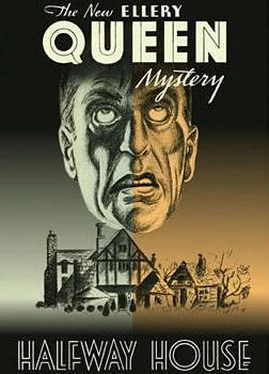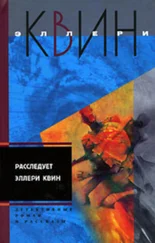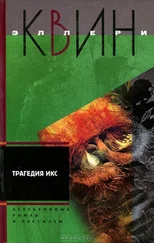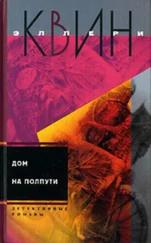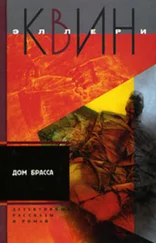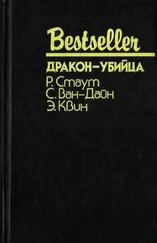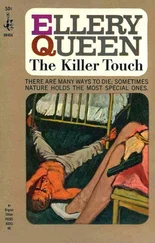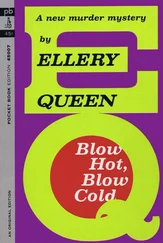In the light of the lamp Andrea stood fast, cemented to the floor by what was so horribly evident to them all: her guilt. Her lips moved, like her grandfather’s, but they made no sound. Then, with a swiftness that caught them — already steeped in horror — by complete surprise, Andrea streaked toward the side door and was gone.
It happened so suddenly that until the cough of an automobile engine came muffled to their ears they were too stupefied to stir. Even Ellery stood rooted to the spot. Then the motor roared and they heard a car thunder away, receding with incredible swiftness.
Senator Frueh screamed, “What’s she done, damn her?” and scrambled toward the door. His cry snapped the spell; they awoke and boiled in a mass after him. In a moment the shack was empty except for the old man in the wheelchair. He sat alone, staring sightlessly with his one good eye at the open doorway.
Outside they stumbled over one another in their haste. In the darkness that tail-light of a car was rapidly diminishing on Lamberton Road in the direction of Duck Island. Everybody ran for a car. A voice shouted: “My car — it won’t go!”
Other shouts arose. “Mine, too! What—?”
“The gas. Smell the gas,” muttered Ellery. “Someone’s drained the tanks...”
“That damned Angell!” There was a blistering oath. “He’s in cahoots with her! The two of them—!”
And then someone else yelled: “Mine — there’s still some...” They heard a flywheel turn over. A car shot out of the driveway and careened on two wheels into Lamberton Road. It was soon lost to sight behind the first car.
They grouped themselves in the road, straining into the darkness. Everything was unreal. Nothing seemed possible in this night, on this road, by this house, under this sky. They could only stare and breathe, stupidly, like animals.
Then Ellery said, “She can’t get far. There must be some gas left in each tank. We’ll pool the dregs and follow!”
The occupant of the second car, nerves singing, drove recklessly, intent on the speck of crimson light far ahead. The road was pitch-dark; they were somewhere on Duck Island already. The night, the sky, the road, seemed interminable. Crazily, that red speck in the distance danced, bobbed, fell, stopped. It grew larger and larger as the second car hurtled toward it. Something had happened. In Andrea’s condition — panic-stricken, blind, driven by fear — it was a wonder she had managed to control the car at all.
The brakes of the second car squealed, the car staggered, stopped dead, throwing its driver against the wheel. Across the road Andrea’s face, behind her wheel, was a cerulean smudge; she was slumped in the seat, staring hopelessly into the sea of the night. She had taken a huge sedan in her flight; it had run slightly off the road and smashed into a tree. The only light came from the stars, and they were far away.
“Andrea!” She did not seem to hear; her right hand stole to her throat and pressed. “Andrea, why did you run away?”
She was afraid now, very plainly afraid. Her head turned slowly, pivoted by her terror. In the faint light her eyes glowed with it. The pursuer stood calmly in the road between the two cars, hands hanging loosely. “Andrea, my dear. You needn’t be afraid of me. God knows I’m tired of it all. I wouldn’t harm you. If you only knew.” The dim face between the two cars stirred, settled, was still. “They’ll be along soon. Andrea, you did remember seeing, on the table that night, the...?”
Andrea’s lips moved soundlessly, as if even her vocal cords had been paralyzed by the pressure of her fear.
Far up the road a car was coming, swimming in dark dust. Its headlights, stuck on the tips of the tubular beams like the antennæ of an insect, probed the darkness, lightened the sky a little.
“Before they come.” The speaker stopped, sighed with a childlike weariness. “I wanted you to know I never intended you any harm. I mean, after you walked in on me that night so unexpectedly. I didn’t know it was you when I struck. Then, when you fell... I couldn’t kill you, Andrea. That would have been insane. I killed Joe Gimball because he was no longer fit to live. Only death could wipe out what he had done, and someone had to send him along. Why not I? Well, it’s done. It’s over. This man thinks you killed Joe, ran away because you are guilty. I know why you ran away, Andrea — because just now you remembered what it was you saw on the table that night.
“Of course I can’t permit you to keep quiet any longer when you yourself are suspected. I thought I could be clever; I didn’t see why I should sacrifice my life in taking a life which had to be taken. I see now that I should have done it simply, without plan, and then given myself up. It would have been — well, cleaner.” There was a wry smile on that steady face hanging in the road. Andrea cried out suddenly, a sobbing cry torn from her throat not by horror but by pity.
Something flashed in the hand so near her. There was a lightning movement from inside the sedan, simultaneous with the calm words, “Goodbye, Andrea. Remember me — well, remember me. I hope... she will remember me.” The hand flashed again, upward this time.
Andrea screamed, “Oh, don’t!”
Bill Angell roared from the back of the second car: “Andrea, for God’s sake! Down!”
Men were spewed forth from the side of the road behind the sedan, guns in their hands. The rear door of the sedan swished open; Bill Angell sprang down to the road.
The face of the pursuer on the road convulsed; a finger tightened, there was a stunning report, smoke, a flash of fire. But the figure merely staggered, it did not fall; an expression of immense surprise came over that handsome face, to be replaced instantly by bitterness and then determination. “Sold out!” It was a mutter.
Then the figure leaped forward, dropping the useless revolver, and grappled with Bill, groping fiercely for the weapon in Bill’s hand. They struggled all over the road, brilliantly illuminated by the headlights of the third car, just roaring up. The men who had materialized from the side of the road were upon them like ants, swarming, clutching, shouting.
There was another report; as if it were a signal, the struggle ceased, the men fell away. There was silence under the dark sky. The people pouring out of the third car stopped in their tracks. This time there was no surprise on the face of the executioner of Joseph Kent Gimball; only peace. The figure lay peacefully in the road, relaxed in death, asleep forever.
Andrea said stiffly: “Bill. Oh, Bill. You’ve killed—”
Bill was panting, drawing huge gulps of the night air into his lungs. As his chest heaved he looked down at the quiet figure. Bill’s revolver was still clutched in its fingers. “Suicide. Fought me for the gun. I couldn’t prevent it. Dead?”
Chief De Jong was squatting in the road, listening with his head on the motionless chest. Then he rose, looking grave. “Dead, all right. Mr. Queen?”
Ellery ran up. He demanded abruptly, “Are you all right, Andrea?”
“All right.” Her voice was muffled. Suddenly she fumbled with the front door of the sedan, slipped down, stumbled weeping into Bill’s arms.
“Mr. Queen?” said Chief De Jong again; he seemed embarrassed. “We got it all down — stenographer took it from the side of the road. It’s a confession, all right, and you’ve prevented... well, I guess Pollinger and I owe you an apology.”
“The one to be congratulated,” said Ellery, “is this young woman.” He pressed the cold fingers clasped about Bill’s neck. “That was well done, Andrea; well done, my dear. The only thing I was doubtful about was our friend’s reaction to your flight. It might have ended in tragedy for you. I prevented that by sending some friends of mine to the right place well in advance, for a little job of substituting blank cartridges for lethal ones. Well done, Andrea; you followed my instructions to the letter.”
Читать дальше
